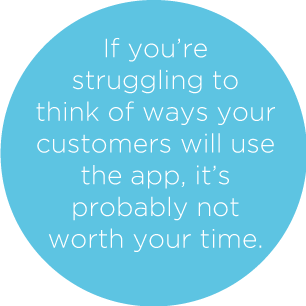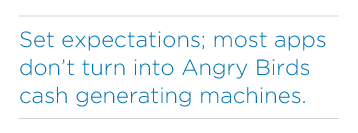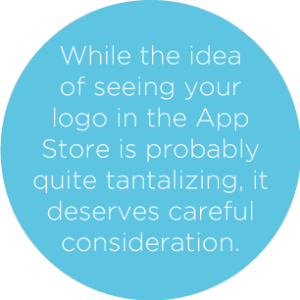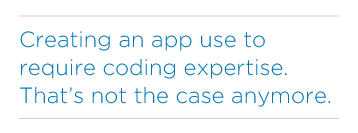According to a joint report filed in 2012 by comScore, 15 miles, and Localeze, 49% of people with smartphones or tablets find local information through apps, rather than through surfing the web, email, social media, or any other method. That number has been steadily increasing over the past few years, so it’s safe to assume that the percentage now comfortably sits over 50%. If you’re a small business owner, it doesn’t take an MBA to realize that it’s a potentially huge number of possible customers out there waiting to learn more about your company.
But I bet you’re wondering—is it worth the considerable time, money, and effort to make an app for my small business? Aren’t proprietary apps only for the mega giant companies? You might be surprised to realize that the answers to those questions might be yes and no, respectively.
 What value a proprietary app can have for your small business, and if it’s worth creating
What value a proprietary app can have for your small business, and if it’s worth creating
As little as five years ago, it would have cost the average small business owner some serious coin to make their own app – that is no longer the case as the proliferation of smartphones has opened the market up for affordable app development solutions. Having said that, creating a dedicated app still isn’t right for every small business. Before you dive in headfirst, take inventory of your situation and ask yourself a few key questions.
1. Is my business a good fit for an app?
Be honest with yourself here – while the idea of seeing your company logo up on the Apple App Store or the Google Play marketplace is probably quite tantalizing, it deserves careful consideration. Certain types of businesses by their very nature lend themselves quite well to a dedicated app. Anything retail is a naturally good fit as you can center your app and its functionality around your various products. A flower shop would have no shortage of opportunities for users to scan a QR code on a pot to learn more about the plant inside. A restaurant could allow users to look up detailed nutritional information about each and every dish that’s offered, and offer discounts and deals directly through push notifications. An electrical supply store, however, might struggle to find creative ways to make their products interesting to the average consumer.
Nothing is outside of the realm of possibility however – you might just have to get more creative in your thinking. But if you’re struggling to think of ways in which your customers will use the app to interact with your business, it’s probably not worth your time.
2. What do you hope to achieve with the app?
 Before you go too far down the app rabbit hole, you need to clearly establish precisely how it can help you and your small business. Are you going to allow users to purchase your goods or services directly from the app, or are you simply looking for increased mindshare from your mobile-connected patrons? Considering that the average mobile app user is a bit younger than the average regular consumer, what will your message be? Are you going to use the app as a vehicle to deliver specialized offers and discounts to the users? If so, what will they be and how much more valuable will they be over the ones you offer to non-app users? Are you mainly hoping to further connect with your mega fans and followers, those that are your absolute most loyal? Or are you trying to attract a wider audience and recruit new fans and mega fans? Helping understand what exactly you are looking to get out of your small business app will help you (or those that develop it for you) have a clearer end goal in mind and reduce development cost and time.
Before you go too far down the app rabbit hole, you need to clearly establish precisely how it can help you and your small business. Are you going to allow users to purchase your goods or services directly from the app, or are you simply looking for increased mindshare from your mobile-connected patrons? Considering that the average mobile app user is a bit younger than the average regular consumer, what will your message be? Are you going to use the app as a vehicle to deliver specialized offers and discounts to the users? If so, what will they be and how much more valuable will they be over the ones you offer to non-app users? Are you mainly hoping to further connect with your mega fans and followers, those that are your absolute most loyal? Or are you trying to attract a wider audience and recruit new fans and mega fans? Helping understand what exactly you are looking to get out of your small business app will help you (or those that develop it for you) have a clearer end goal in mind and reduce development cost and time.
3. What platform will your app appear on?
For a few years after Apple unveiled the App Store in 2008, it was the unquestioned king. Now, the landscape is considerably more varied, with Android phones taking a serious chunk out of smartphone ownership pie. Blackberry is still around and Microsoft is putting some serious effort and cash behind its latest lines of Windows phones.
 So if you’ve gone through and determined that your business is a good fit for an app and you have clearly laid out goals for what you want to achieve with it, where should it appear? To be frank, for a small business owner’s purposes, you can all but forget about Windows, Blackberry, and anything else that isn’t Android or Apple.
So if you’ve gone through and determined that your business is a good fit for an app and you have clearly laid out goals for what you want to achieve with it, where should it appear? To be frank, for a small business owner’s purposes, you can all but forget about Windows, Blackberry, and anything else that isn’t Android or Apple.
According to a recent Pew survey (June 2013), 25% of all cell phone users reported owning an Apple phone, and 28% for Android. Blackberry still is hanging on with a death rattle of 4%, while the neophyte of the group, Windows, only clocked in for 1%. Unless you have money and time to burn, it is not worth your while to develop Blackberry or Windows specific versions of your app, at least not where we currently sit. Apple and Android are the undisputed kings of smartphones and their app stores are by far the most trafficked. Focus on one of these platforms, or even better, both, to assure you hit the widest audience possible and make your dollars stretch the farthest.
4. Who is going to develop it?
Here is where most small business app ventures fall out, and why many still view it as something out of their reach. During the early days of app development and distribution, developers needed to be well versed in programming native lines of code into a computer. Creating an app required professional-level knowledge and coding expertise. That is most assuredly not the case anymore.
 Your options here fall into three basic categories: finding someone on staff with the requisite skills and knowledge to develop your app for you; outsource the work to a professional or team of professional app developers; or look into one of several third party “streamlined” solutions that allow you to create your own app with little technical expertise (think of it like building a website using WordPress or 1and1 instead of hard-coding it).
Your options here fall into three basic categories: finding someone on staff with the requisite skills and knowledge to develop your app for you; outsource the work to a professional or team of professional app developers; or look into one of several third party “streamlined” solutions that allow you to create your own app with little technical expertise (think of it like building a website using WordPress or 1and1 instead of hard-coding it).
Depending on the nature of your business, you may have one or several very technically-minded people already on your staff. It would be worth a quick poll of your employees to see how many of them are comfortable with programming and have worked on apps before – their answers may surprise you. Both Apple and Android are very developer friendly platforms and allow anyone to download the SDK (Software Development Kit) for free. Many folks did and have tinkered around with them in their spare time, and due to how long they have been out there and available, there are many forums and message boards that provide new users with help. Just be sure to fully explain the nature of your app and what you want it to be to ensure it’s nothing over their heads. You’ll also have to discuss compensation, but somebody on your staff that is willing and able to help is likely going to be your cheapest option. Depending on their skill level, however, you app may lack polish.
There is no shortage of professional developers to be found that can make the app of your dreams. They will be able to add high-quality effects and widgets that will give your app a distinctly professional look and feel. They will also more than likely be able to sit with you during the initial questioning phases to help you hone in on what an app for a small business of your type and size should be like, since odds are they’ve created several in the past for other clients. Be prepared, though, that this will almost certainly be your priciest option – if you have the capital on hand and want a high-functioning app that is rich in features, do your homework and research firms online. Be sure to also vet their portfolio and check out apps they have created. This will also most likely be your quickest option in terms of turnaround time, so consider it if time is a factor.
 Doing it yourself might seem like a daunting task, but as app distribution exploded in popularity, some smart folks out there realized there is a huge market for people wanting to create a small-scale app but don’t have the requisite programming experience. There are now a wide variety of streamlined software solutions that allow you to drag-and-drop elements into their proprietary software to create functioning apps. A few example solutions that are worth looking into are AppExpress, EachScape, Tiggzi, and BuzzTouch, but there are others. Many also offer porting from Android to Apple (or vice versa) as part of their fee. Speaking of which, fees for these services can run as little as nothing to as much as $2,500 per month depending on what you need from your app, so research again will be key here.
Doing it yourself might seem like a daunting task, but as app distribution exploded in popularity, some smart folks out there realized there is a huge market for people wanting to create a small-scale app but don’t have the requisite programming experience. There are now a wide variety of streamlined software solutions that allow you to drag-and-drop elements into their proprietary software to create functioning apps. A few example solutions that are worth looking into are AppExpress, EachScape, Tiggzi, and BuzzTouch, but there are others. Many also offer porting from Android to Apple (or vice versa) as part of their fee. Speaking of which, fees for these services can run as little as nothing to as much as $2,500 per month depending on what you need from your app, so research again will be key here.
5. Will it be worth it?
The big question is saved for the end. Whether you choose to hire somebody in-house, pay a team of professionals, or pay a third-party software solution to create your app for you, you’re going to have to open up your wallet a bit to get your app out there. Also, there will be costs in terms of how much time you spend brainstorming and developing this app – you’re the business owner after all, so your time is more valuable than anyone else at the company. And although you can get the word out for free via social media and your website, you’ll definitely need to advertise the fact that your app is out there. It may not cost you dollars and cents, but it will cost you time at the very least and will take a portion of your advertising voice away from other aspects of your business could be promoting. If you have any experience running a cost/analysis breakdown, now would be the time to use it. Be sure to be reasonable with your revenue projections from your app, as most apps do not turn into Angry Birds-esque cash generating machines.
Whether you decide an app is right for your business or not, at the very least you should now feel more comfortable with the concept. Business apps are no longer just for Fortune-500 companies, and there are a host of solutions that will allow you to create your own app for free. But being honest with yourself and creating realistic goals during the first question-and-answer phase will be key in determining if an app is in your business’ future.






Leave a Comment